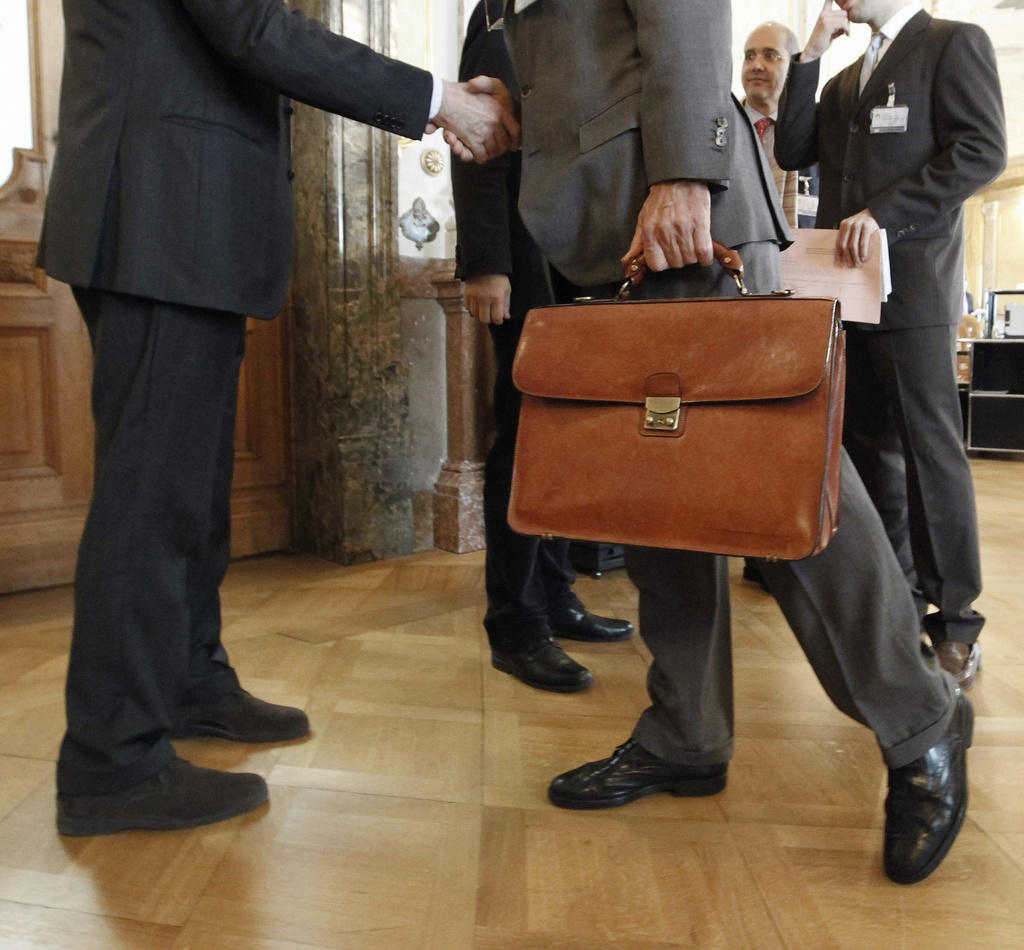MPs are the biggest lobbyists in Swiss parliament
This autumn, the Swiss are set to elect a new parliament. But MPs are increasingly, and more aggressively, representing the particular interests of companies, associations and organisations. It’s an indication of a cultural change in the legislative body.

In March 2018, when the Swiss parliament rushed a new and very controversial social insurance law on allowing social welfare detectives through in just a week, the German-speaking daily Tages-Anzeiger used the dramatic headlineExternal link: “As if the devil were chasing them”.
Why such a rush? Isn’t it one of democracy’s most important principles to take time to design a well-balanced and independent legislation?
The answer lies with lobbying. In this particular case, health insurers as well as the Swiss National Accident Insurance Fund (SUVA), orchestrated a real power play to push through their own vested interests: going after people accused of being benefit cheats.
Representing people and companies
How is this possible? It’s all down to the parliamentarians, elected for a four-year period, who are increasingly representing particular interests.
The 246 members of the Swiss parliament have a total of 2,000 vested interests in 1,700 organisations, according to a study recently published by Transparency International SwitzerlandExternal link, a non-governmental organisation.
The average number of mandates is eight per parliamentarian. However, two of them, one centre-right and one left-wing, top the list with 31 and 29 vested interests, respectively.
The phenomenon of lobbying has become more pronounced over the past two decades. Between 2000 and 2011, the average number of mandates per parliamentarian more than doubled. From 2007 to 2015, it rocketed by 20%.

Vested interests
Taking the new social insurance law as an example, the 38 members of the parliamentary Social Security and Health Committees (SSHC)External link, which both rubberstamped the social welfare detectives, have a total of 90 vested interests on the list of Transparency International Switzerland.
The Economic Affairs and Taxation Committees (EATC)External link of the House of Representatives has by far the most lobbyists, according to an analysis from the Zurich University of Applied Sciences.External link Over the past 15 years, 150 to 200 parliamentarians with a vested interest have been at the negotiating table discussing new draft legislations.
The study shows that companies, associations and other organsations try to use parliamentarians instead of traditional lobbyists to influence legislation to support their vested interests.
#Dear Democracy
This text is part of #DearDemocracy, a platform on direct democracy issues by swissinfo.ch.
“Lobbying has increased alarmingly in Switzerland,” says Alex Biscaro, deputy managing director of Transparency International SwitzerlandExternal link and one of the authors of the NGO’s report into the issue.
Part-time parliamentarians
Why are parliamentarians also lobbyists? One reason is that the Swiss parliamentary militia system – a long-standing tradition – means they are supposed to have a normal job in addition to attending the four annual parliamentary sessions.
Estimates on the workload of a parliamentarian range between 60 and 90%. So a member of parliament has time to work as an independent consultant or be on a company’s payroll as board member. Not only is this completely legal, but it is also intrinsic to the system.
“Lobbying is not all bad. It’s an important and legitimate part of a pluralistic democracy and the militia system,” says Biscaro. Switzerland’s parliamentary mechanism is streamlined and does not give militia politicians much support, he adds.
“They [militia politicians] depend on solid knowledge and practical information, which they often get from those with vested interests. In an ideal world, lobbying helps parliament pass appropriate and viable laws by providing expert knowledge,” Biscaro explains.
Traceable, transparent?
But lobbying has to be transparent with well-defined rules, Biscaro continues. “It has to be clear who represents which interests, and where the revenues from special mandates come from.” It also needs a code of conduct for parliamentarians and lobbyists as well as guidelines on how to deal with conflict of interests and benefits, such as gifts and travel.
“Another vital necessity is the legislative footprintExternal link, a clear, traceable and transparent documentation of who influenced the legislation process, and when.”
Slovenia and the EU Commission, for example, have such a system in place. “They have transparency registers that disclose when lobbyists’ activities are geared to influence members of the commission and their legislation,” says Biscaro.
In Switzerland, committee decisions are usually made in a so-called black box, a hermetically sealed meeting room. This is an old procedure that aims to prevent leaks.
Why is there such a high concentration of vested interests in parliamentary committees? It’s because these usually set the course, which is often decisive for subsequent debates in the councils and possible future referenda.
For Biscaro, influences of a non-transparent and sensitive nature are a danger to democracies. “This is particularly problematic for our referendum system, especially when it is not disclosed who finances campaigns in order to influence how the Swiss people vote.”
Tailor-made lobbying
The health sector is particularly prone to pressure from lobbyists, especially from the pharmaceutical industry. According to Viktor Parma, a parliamentary journalist of 40 years’ standing, the two multinationals Novartis and Roche are most active in this field.
“When the law for using social welfare detectives was discussed, the advisory committees of both chambers of parliament acted to some extent in the interest of health insurers,” says Parma.
Parma published a book about classic lobbying in parliament in 2011, with Oswald Sigg, a former Swiss government spokesman.
But since its publication, he has observed some fundamental changes: classic business lobbying is getting weaker while individual lobbying is growing stronger. Companies and organisations now send their own people to the capital to influence legislation that will serve their best interests.
Change
According to Parma, the financial sector is another example of lobbying in parliament. Once upon a time, Swiss BankingExternal link, the umbrella organisation of the Swiss financial sector, used to be very influential. In the last few years, however, the sector has been broken up, partially due to international pressure.
“This has resulted in the players of the Swiss banking sector acting individually. The big banks and other actors now have their own lobbyists,” Parma says.
The situation is similar in the economy sector, seen by many as the main player in lobbying. The Swiss Federation of Commerce and Industry, the former umbrella organisation for the Swiss economy, used to be so powerful that its director was actually described as a cabinet minister behind closed doors.
Nowadays economiesuisse,External link as it is known, is the umbrella organisation representing the Swiss economy; but companies increasingly act on their own. “Lobbyists from the classic industry associations now have to justify their existence; you can almost feel sorry about this,” says Parma.
For him, lobbying in Swiss politics is “non-transparent, unregulated and imbalanced in many areas. Hence, it creates perilous gateways for undemocratic interferences and increases the risk of corruption”.
Little control
Swiss parliamentarians list their connections to the private sector in the register for vested interests.External link As there is no controlling body, there is no guarantee whether their listings are comprehensive.
Every parliamentarian has two visitors’ badges to give to whomever they choose. This gives external lobbyists privileged access to parliament.
If a parliamentarian has been “bought” by lobbyists, parliament can withdraw his or her immunity. In September 2018 saw the first accusation with consequences. Former parliamentarian Christian Miesch (conservative right Swiss People’s Party/Canton Basel-Country) is now being tried by the federal prosecutor for alleged passive bribery.
Most cases where lobbying may have gone too far are usually settled informally by “gentlemen’s agreement”, Viktor Parma says.

In compliance with the JTI standards
More: SWI swissinfo.ch certified by the Journalism Trust Initiative















You can find an overview of ongoing debates with our journalists here . Please join us!
If you want to start a conversation about a topic raised in this article or want to report factual errors, email us at english@swissinfo.ch.